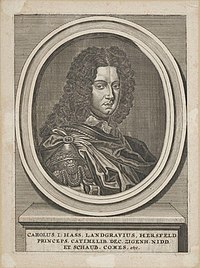Charles, Landgrave of Hesse-Kassel
| Charles I | |
|---|---|
| Landgrave of Hesse-Kassel | |
 |
|
| Born |
3 August 1654 Kassel, Landgraviate of Hesse |
| Died | 23 March 1730 (aged 75) Kassel, Landgraviate of Hesse |
| Spouse | Maria Amalia of Courland (m. 1673; d. 1711) |
| Issue | Wilhelm Karl Frederick I of Sweden Christian Sophie Charlotte Karl William VIII, Landgrave of Hesse-Kassel Leopold Ludwig Marie Luise, Princess of Orange Maximilian George Charles Eleonore Antoine Wilhelmine Charlotte |
| House | Hesse-Kassel |
| Father | William VI, Landgrave of Hesse-Kassel |
| Mother | Hedwig Sophia of Brandenburg |
| Religion | Calvinism |
Charles of Hesse-Kassel (German: Karl von Hessen-Kassel; 3 August 1654, Kassel, Landgraviate of Hesse – 23 March 1730, at the same place), of the House of Hesse, was the Landgrave of Hesse-Kassel from 1670 to 1730.
Charles was the second son of William VI, Landgrave of Hesse-Kassel and Hedwig Sophia of Brandenburg (1623–1683). Until 1675 his mother ruled as his guardian and regent before Charles was old enough to take over the administration for the next 5 years. His older brother, William VII, had died in 1670 shortly after reaching adulthood, even before he had had the chance to make any changes with the administration.
Under the reign of Charles, the consequences of the Thirty Years' War in the agricultural county could be overcome more quickly than they were in the more industrialized regions of the German Empire. He pushed for the recreation of a large army and put it in the service of other countries in the War of Spanish Succession. His soldiers, he gave, as well as other princes of his time, to foreign service for the Subsidiengelder [ subsidies ]. This policy remained controversial for its dealings with the mercenaries, according to the 1908 Brockhaus (Volume 9, page 96) :
"Dieses System verbesserte die Finanzen, aber nicht den Wohlstand des Landes,
und brachte den glänzenden Hof selbst in ausländische Familienverbindungen."
[ This system improved the finances but not the prosperity of the country,
and brought to the brilliant court itself foreign familial connections. ]
Charles left in 1685 to his younger brother Philipp as the latter's Paragium a small part of the Landgraviate of Hesse, the so-called Landgraviate of Hesse–Philippsthal, named after Philippsthal [ "Philipp's Valley" ] (formerly Kreuzburg [ "Cross Castle" ]) a place near Vacha on the Werra River.
...
Wikipedia
